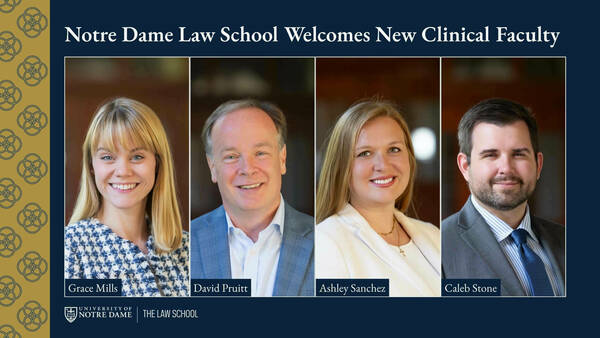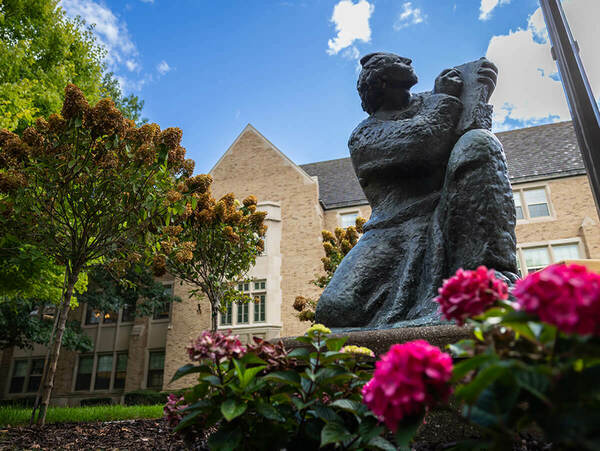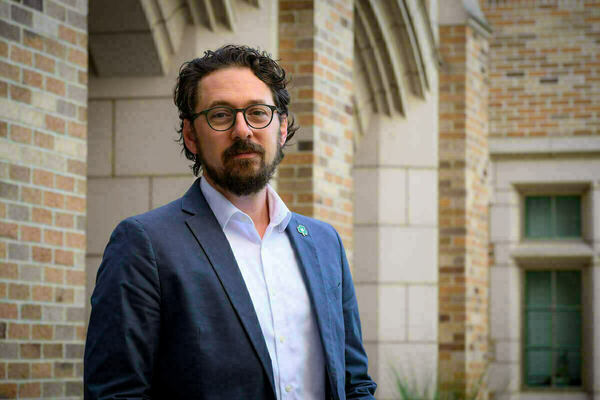2025 Naughton Fellowships awarded to four joint faculty projects
The University of Notre Dame’s Naughton Fellowship program has announced its faculty awardees for the 2025-2026 cohort. Faculty from leading Irish universities and Notre Dame have come together to work on four research projects as a part of the Naughton Faculty Accelerator program.
Funded by a gift from the Naughton family in 2008, the Naughton Fellowships foster leadership through international partnerships and stimulate collaborative research efforts. The mission of the Faculty Research Accelerator program is to catalyze and support collaborations at the leading research universities of Ireland and the University of Notre Dame, in order to foster deeper and stronger ties between both the institutions and the two countries.
Brian Baker, the Coleman Professor of Life Sciences at Notre Dame, said, “I extend my warmest congratulations to this year’s faculty fellows, and express my admiration for the dynamic and innovative work they are pursuing in their fields.”
Baker, who serves as the Naughton Fellowship Committee Chair, added, “We are grateful to the Naughton family for their support in contributing to a culture of international collaboration among faculty members.”
Margaret (Coad) McGuinness, assistant professor in Notre Dame’s Department of Aerospace and Mechanical Engineering, will collaborate with Pádraig Cantillon-Murphy, professor in the School of Engineering at University College Cork, on a project titled “Capsule Navigation in Image-Guided Gastrointestinal Interventions using Everting Toroidal Robotics.” The project will test the feasibility of a new paradigm in capsule endoscopy, which couples the autonomous capabilities of everting toroidal robotic propulsion with real-time navigation and visualization enabled by on-chip and wireless magnetic tracking, with the ultimate goal of navigating and imaging the entire gut system.
Meenal Datta, assistant professor in Notre Dame’s Department of Aerospace and Mechanical Engineering, will work with two Dublin-based colleagues on a project titled “Unveiling the mechanical determinants of plasma cell dyscrasias.” The objective of this collaboration is the development of a new microtissue model for studying the effects of mechanical stimuli on bone marrow, effects which may determine an individual’s likelihood of developing a plasma disorder, such as multiple myeloma, as they age. Datta’s collaborators are Despina Bazou, assistant professor in the Department of Biology and the Kathleen Lonsdale Institute for Human Health Research at Maynooth University, and David Hoey, professor of biomedical engineering in the School of Engineering at Trinity College Dublin.
Joanna Cecilia da Silva Santos, assistant professor in Notre Dame’s Department of Computer Science and Engineering, will work with Liliana Pasquale, associate professor in University College Dublin’s School of Computer Science, on a project titled “Context-aware Secure Code Generation using Large Language Models.” The researchers will collaborate to enhance the security of code generated by AI assistants by developing a framework that incorporates security-relevant contextual information in the code generation process, with the goal of alleviating the burden on developers in identifying and fixing security issues.
Cody Smith, Elizabeth and Michael Gallagher Associate Professor of Biology at Notre Dame, will collaborate with Michael-John Dolan, assistant professor in the Department of Genetics at Trinity College Dublin, on a project titled “Transcriptional Control of Microglial Myelin Clearance During Demyelination and Repair.” The researchers will investigate the genetic factors that regulate the function of microglia, the brain's resident immune cells. They will specifically investigate the clearance of myelin debris, a process which is critical for myelin regeneration and the halting of demyelinating diseases such as multiple sclerosis.
Applications for future Naughton Fellowships, including undergraduate, masters, and faculty fellowships, will open for submissions in the fall of 2025. To learn more, please visit naughton.nd.edu.
Contact
Erin Fennessy / Writing Program Manager
Notre Dame Research / University of Notre Dame
efenness@nd.edu / +1 574-631-8183
research.nd.edu / @UNDResearch / linkedin.com/company/undresearch
About Notre Dame Research
The University of Notre Dame is a private research and teaching university inspired by its Catholic mission. Located in South Bend, Indiana, its researchers are advancing human understanding through research, scholarship, education, and creative endeavor in order to be a repository for knowledge and a powerful means for doing good in the world. For more information, please visit NDR's website or NDR's LinkedIn.
Originally published by at naughton.nd.edu on September 10, 2025.
Latest Research
- ND research teams awarded funding to address sustainability challenges around the worldNotre Dame's Just Transformations to Sustainability Initiative has awarded funding to three cross-disciplinary faculty teams leading research on pressing sustainability issues—including forest conservation in the Amazon, watershed…
- Fighting to improve hurricane forecastsResearchers at Notre Dame are improving hurricane forecast accuracy, giving officials time to evacuate and protect residents. Read the article
- Notre Dame Law School Welcomes Four New Clinical Faculty Members for 2025–26Notre Dame Law School is pleased to welcome four new clinical faculty members for the 2025–26 academic year. “It is an honor to welcome such a distinguished group of clinical professors to Notre Dame Law School. Their impressive achievements and deep sense of vocation will enrich our academic…
- Six early-career scholars join the inaugural Provost’s Postdoctoral Fellowship Program.Six interdisciplinary scholars have joined the College of Arts & Letters at the University of Notre Dame to continue their research, obtain invaluable support, and engage in professional development as part of the inaugural Provost’s…
- Politics inspired Democracy Initiative managing director from early ageThis is the first in a series of features highlighting the managing directors of the University's strategic initiatives. The managing directors are key (senior) staff members who work directly with the faculty directors to help implement and operationalize the vision for the initiatives, oversee initiative staff, and serve as thought partners for the faculty directors.
- Notre Dame Launches Sensor Initiative to Combat Bird Flu, Opioid CrisisNosang…










